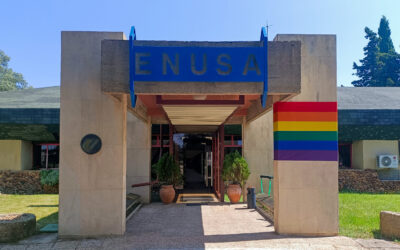They will work on environmental protection and rehabilitation after the dismantling of nuclear facilities, waste management and transportation of nuclear and radioactive materials.
The president of ENUSA has valued this agreement as a great international opportunity for ENUSA and to position itself as a strategic partner of the organization in training and dissemination.
ENUSA and the International Atomic Energy Agency (IAEA) have signed what is their first collaboration agreement. As a result of the excellent relations they have maintained for years, both entities have signed an agreement that, in the words of José Vicente Berlanga, president of ENUSA, “represents a great international opportunity for a nuclear company by facilitating the establishment of alliances with the countries that make up this organization.” The Deputy Director General and head of the IAEA Nuclear Energy Department, Mikhail Chudakov, was present at this event.
The agreement comes to structure and shape the extensive collaboration that has marked the relations between ENUSA and the IAEA and focuses on three lines of action: the nuclear fuel cycle, development of advanced technology fuels (including accident-tolerant fuels) and spent fuel management; radioactive waste management, nuclear facility decommissioning (including dismantling) and environmental rehabilitation (including uranium concentrate production facilities); and the transportation of nuclear and radioactive materials as well as the logistics of radioisotope products for nuclear medicine (including modal transportation, distribution and documentation, their development and implementation).
The IAEA is currently developing and implementing activities with member states in the fields of environmental protection and post-decommissioning rehabilitation of nuclear facilities. ENUSA has deep and unique experience in the rehabilitation of old uranium mines and uranium concentrate manufacturing facilities, which will be a valuable contribution from the Spanish public company to other countries that have the same needs.
In this way, ENUSA becomes a strategic partner in training and dissemination, offering complementary support to the IAEA through various resources such as online tools for distance learning, co-organization of training events and meetings, as well as holding internships and scholarships. “The synergies that can be produced with this collaboration will be beneficial for both parties and will bring the two organizations even closer,” said the president of ENUSA.
This signing took place within the framework of the celebration of the 65th General Conference of the IAEA that was held last week in Vienna and where the ENUSA delegation was received by the Director General of the IAEA, Mariano Grossi, and by the ambassador Permanent Representative of Spain to International Organizations in Vienna, Esther Monterrubio Villarcón.
During this trip, work meetings have also been held with national delegations from the UAE, Argentina and Brazil, which have served to identify the fields of action where our company can meet the needs of these countries. In this sense, there have also been high-level meetings with strategic companies for ENUSA and with representatives of the international organization integrated into the UN such as the director of the Division for Latin America and the Caribbean of the Department of Technical Cooperation of the IAEA, Luis Longoria.
The result of these intense days of work and negotiations represents another step in the search for new markets and business opportunities that mark the internationalization strategy contemplated in ENUSA's 21-30 Strategic Plan. These are actions with which the company is moving forward to lay the foundations over the next ten years that will consolidate it, also on the international scene, as a company specialized in nuclear engineering services, waste management and the dismantling of facilities. nuclear.


